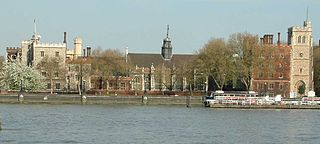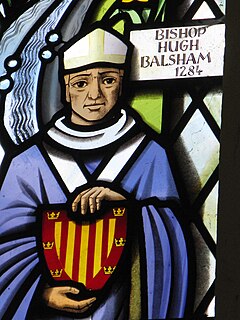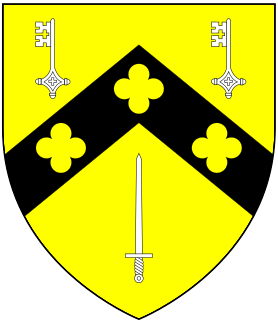Related Research Articles

Boniface of Savoy was a medieval Bishop of Belley in Savoy and Archbishop of Canterbury in England. He was the son of Thomas, Count of Savoy, and owed his initial ecclesiastical posts to his father. Other members of his family were also clergymen, and a brother succeeded his father as count. One niece was married to King Henry III of England and another was married to King Louis IX of France. It was Henry who secured Boniface's election as Archbishop, and throughout his tenure of that office he spent much time on the continent. He clashed with his bishops, with his nephew-by-marriage, and with the papacy, but managed to eliminate the archiepiscopal debt which he had inherited on taking office. During Simon de Montfort's struggle with King Henry, Boniface initially helped Montfort's cause, but later supported the king. After his death in Savoy, his tomb became the object of a cult, and he was eventually beatified in 1839.

Hugh de Balsham was a medieval English bishop.

Walter de Gray was an English prelate and statesman who was Archbishop of York from 1215 to 1255 and Lord Chancellor from 1205 to 1214. His uncle was John de Gray, who was a bishop and royal servant to King John of England. After securing the office of chancellor, the younger Gray was a supporter of the king throughout his struggles and was present at the signing of Magna Carta in 1215. After two unsuccessful elections to a bishopric, he became Bishop of Worcester in 1214 but soon after moved to York. During the reign of John's son, King Henry III, Gray continued to serve the king while also being active in his archdiocese. He died in 1255 and was buried at York Minster, where his tomb still survives.
Michael Northburgh, otherwise Michael de Northburgh (Northborough), was the Bishop of London between 1354 and his death in 1361. He was the nephew of Roger Northburgh, Bishop of Coventry and Lichfield.

Richard Poore or Poor was a medieval English bishop best known for his role in the establishment of Salisbury Cathedral and the City of Salisbury, moved from the nearby fortress of Old Sarum. He served as Bishop of Chichester, Bishop of Salisbury and Bishop of Durham.
Ralph Neville was a medieval clergyman and politician who served as Bishop of Chichester and Lord Chancellor of England. Neville first appears in the historical record in 1207 in the service of King John, and remained in royal service throughout the rest of his life. By 1213 Neville had custody of the Great Seal of England, although he was not named chancellor, the office responsible for the seal, until 1226. He was rewarded with the bishopric of Chichester in 1222. Although he was also briefly Archbishop-elect of Canterbury and Bishop-elect of Winchester, both elections were set aside, or quashed, and he held neither office.
Walter Giffard was Lord Chancellor of England and Archbishop of York.
Richard le Grant was Archbishop of Canterbury from 1229 to 1231.
Nicholas Farnham was a medieval Bishop of Durham.
Walter of Kirkham was a medieval English official who held the positions of Keeper of the Wardrobe, Dean of York, and Bishop of Durham. He was elected bishop over Aymer de Valence, 2nd Earl of Pembroke, the brother of King Henry III. As bishop, he was instrumental in the founding of Balliol College in the University of Oxford.

Walter Branscombe was Bishop of Exeter from 1258 to 1280.
Roger de Clinton was a medieval Bishop of Coventry and Lichfield. He was responsible for organising a new grid street plan for the town of Lichfield in the 12th century which survives to this day.
Richard Peche was a medieval Bishop of Lichfield.
Geoffrey de Muschamp was a medieval Bishop of Coventry.
Alexander de Stavenby was a medieval Bishop of Coventry and Lichfield.
Roger Weseham was an English medieval Bishop of Coventry and Lichfield.

Richard Blund was a medieval Bishop of Exeter.
Thomas Bitton was a medieval Bishop of Exeter.
Ralph of Maidstone was a medieval Bishop of Hereford.
William de Raley was a medieval judge, administrator and bishop. Most historians now believe that he was the author of the great law book Bracton.
References
- Carpenter, D. A. (2004). "Meuland [Meuleng, Meulent, Molend], Roger de [Master Longespée]". Oxford Dictionary of National Biography (online ed.). Oxford University Press. doi:10.1093/ref:odnb/37908.(Subscription or UK public library membership required.)
- Fryde, E. B.; Greenway, D. E.; Porter, S.; Roy, I. (1996). Handbook of British Chronology (Third revised ed.). Cambridge, UK: Cambridge University Press. ISBN 0-521-56350-X.
- Moorman, John R. H. (1955). Church Life in England in the Thirteenth Century (Revised ed.). Cambridge, UK: Cambridge University Press. OCLC 213820968.